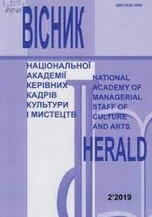МІСТЕРІАЛЬНО-МІФОЛОГІЧНІ ПІДВАЛИНИ УКРАЇНСЬКОГО МУЗИЧНОГО ТЕАТРУ XIX СТОЛІТТЯ (НА ПРИКЛАДІ ТВОРЧОСТІ С. ГУЛАКА-АРТЕМОВСЬКОГО ТА М. ЛИСЕНКА)
MYSTERIOUS AND MYTHOLOGICAL FOUNDATIONS OF UKRAINIAN MUSICAL THEATRE OF THE 19TH CENTURY (BASED ON THE WORK OF S. GULAK-ARTEMOVSKY AND M. LYSENKO)
Author(s): Olga Viktorivna MuravskayaSubject(s): Theatre, Dance, Performing Arts, Cultural history, Music, 19th Century, History of Art
Published by: Національна академія керівних кадрів культури і мистецтв
Keywords: Ukrainian musical theatre; school theatre; mystery; interlude; S. Gulak-Artemovsky's “Zaporozhets by the Danube”; musical theatre by M. Lysenko;
Summary/Abstract: The purpose of the study is to reveal the sacred and mysterious genesis and spiritual foundations of the classics of Ukrainian musical theatre, represented by the work of S. Gulak-Artemovskyi and M. Lysenko. Research methodology. Interdisciplinary, historical-cultural, genre-stylistic approaches were essential for this work. The scientific novelty of the work is determined by its analytical perspective, which takes into account not only the originality of the creative contribution of S. Gulak-Artemovskyi and M. Lysenko, but also the spiritual and mysterious genesis of their opera heritage. Conclusions. The poetics of the Ukrainian musical theatre was formed against the background of the traditions of the baroque school theatre, the genre specifics of which went back to the Byzantine ritual and cult practice and liturgical drama in combination with the mythological and archetypal instructions of the Ukrainian national consciousness. The classics of Ukrainian opera of the 19th century, represented in the work of S. Gulak-Artemovskyi and M. Lysenko, inherit this theatrical-mysterial and ethical-didactic basis in the cultural-historical realities of its era. “Zaporozhets by the Danube” within the comic genre highlights the archetypal features of the Zaporozhian Cossack type, as well as the mythologem of the “search for paradise”. Against the background of the poetics of the historical-heroic opera, this problem is presented in “Taras Bulba” by M. Lysenko, which creates an author's version of Gogol's story with obvious parallels with the biblical theme and an appeal to the dominant bass timbre, which genetically descended from the Orthodox cult singing practice. M. Lysenko's children's operas at the level of mini-mysteries symbolise involvement in national mythology and its archetypal instructions, an appeal to the Ukrainian mysterious Universe through the author's “cosmological fairy tale”.
Journal: Вісник Національної академії керівних кадрів культури і мистецтв
- Issue Year: 2022
- Issue No: 3
- Page Range: 177-183
- Page Count: 7
- Language: Ukrainian

